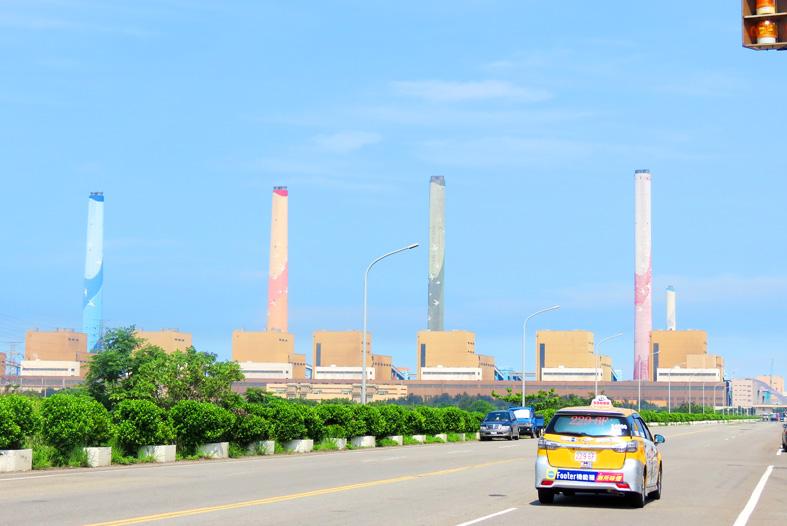A spike in demand for electricity made it necessary to restart the third coal-fired generator at the Taichung Power Plant, Taiwan Power Co (Taipower, 台電) said yesterday as a feud with the Taichung City Government lingers.
Taichung Mayor Lu Shiow-yen (盧秀燕) has sought to keep the generator from being used. In 2019, he revoked Taipower’s license to operate the generator.
However, the state-run utility has taken the city government to court over the license revocation and won the case in February last year, Taipower manager Chang Ting-shu (張廷抒) said.

Photo: Su Ching-feng, Taipei Times
“We would like to remind the Taichung City Government that operation of the third coal-fired generator is completely legal,” Chang said, adding that the municipality is being “unreasonable and obstructive.”
The plant has long been a sore spot for residents, who complain about pollution.
Taipower said an unexpected high rate of electricity use while plants elsewhere were undergoing maintenance made it inevitable that the generator would be brought back online.
“From January to last month, we used 3.3 percent more electricity than the same period last year,” Chang said. “Returning Taiwanese manufacturers, high demand for exports and increased domestic electricity use are all up.”
“We were taken by surprise,” he said.
The generator has been retrofitted to reduce pollution, Chang said.
“It used to emit 0.6g to 0.7g of particulate pollution per kilowatt-hour, but that has been reduced to 0.46g,” he said.
Taichung’s air quality problems would subside when liquefied natural gas (LNG) plants — due to come online this summer — start generating electricity, he said, adding that Taiwan would not face an electricity shortage this summer.
However, Taiwan’s water situation is exacerbating an electricity crisis, said Chen Jong-shun (陳中舜), an assistant research fellow at the Chung-Hua Institution for Economic Research (中華經濟研究院).
“Taiwan is highly reliant on hydroelectricity to adjust peak energy usage, and the serious water shortage has directly affected our ability to use hydroelectricity,” Chen said.
The problem would worsen, as energy use spikes in summer, with July and August bringing the greatest demand, he said.
Moreover, the Guosheng Nuclear Power Plant in New Taipei City’s Wanli District (萬里) in June is to reduce electricity generation.
The central government should keep the Guosheng and Ma-anshan Nuclear Power Plant in Pingtung County’s Ma-anshan (馬鞍山) running beyond their planned lifespans to save Taiwan from further power crunches, Chen said.
“It is absolutely doable on a technical level, as long as Taipei has the political resolve,” he added.

Honda Motor Co absorbing Nissan Motor Co could give the two struggling Japanese brands the scale they need to take on China’s BYD Co (比亞迪), sales figures released yesterday showed. Honda, which earlier this week sketched out plans for a deal that amounts to an acquisition of Nissan, sold 3.43 million cars globally in the first 11 months of this year. Nissan said it sold just over 3 million. China’s biggest automaker BYD sold 3.76 million vehicles over the same period — a clear illustration of how Nissan and Honda are weak alone, but together might have a fighting chance. Honda and Nissan

SEMICONDUCTORS: Samsung and Texas Instruments would receive US$4.75 billion and US$1.6 billion respectively to build one chip factory in Utah and two in Texas Samsung Electronics Co and Texas Instruments Inc completed final agreements to get billions of US dollars of government support for new semiconductor plants in the US, cementing a major piece of US President Joe Biden administration’s CHIPS and Science Act initiative. Under binding agreements unveiled Friday, Samsung would get as much as US$4.75 billion in funding, while Texas Instruments stands to receive US$1.6 billion — money that would help them build facilities in Texas and Utah. The final deals mean the chipmakers can begin collecting the funding when their projects hit certain benchmarks. Though the terms of Texas Instruments’ final agreement is

Call it an antidote to fast fashion: Japanese jeans hand-dyed with natural indigo and weaved on a clackety vintage loom, then sold at a premium to global denim connoisseurs. Unlike their mass-produced cousins, the tough garments crafted at the small Momotaro Jeans factory in southwest Japan are designed to be worn for decades, and come with a lifetime repair warranty. On site, Yoshiharu Okamoto gently dips cotton strings into a tub of deep blue liquid, which stains his hands and nails as he repeats the process. The cotton is imported from Zimbabwe, but the natural indigo they use is harvested in Japan —

Japan ramped up its warnings against currency speculation on Friday after the yen slid to a five-month low following a hint from the central bank chief that he might wait longer than expected before raising interest rates. “The government’s deeply concerned about recent currency moves, including those driven by speculators,” Japanese Minister of Finance Katsunobu Kato said. “We will take appropriate action if there are excessive moves in the currency market.” The yen regained some ground against the dollar after Kato’s remarks, strengthening to as much as ¥156.89 after earlier weakening to ¥157.93. The Japanese currency strengthened a little further after currency